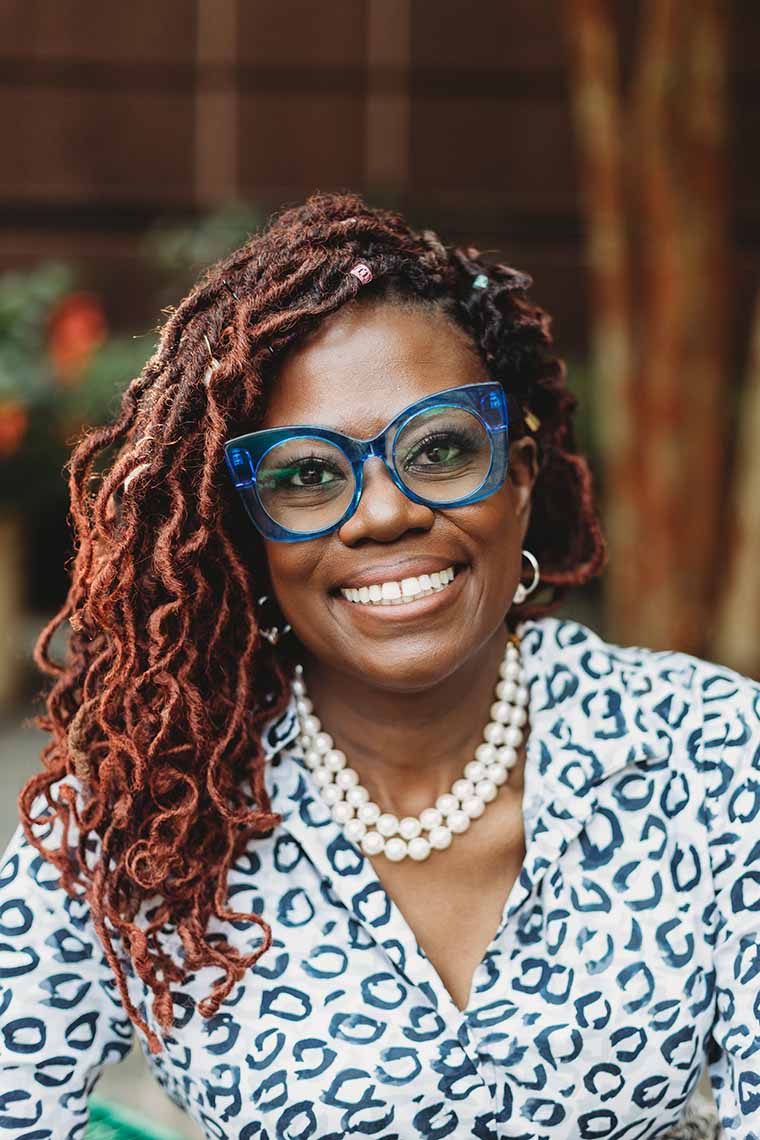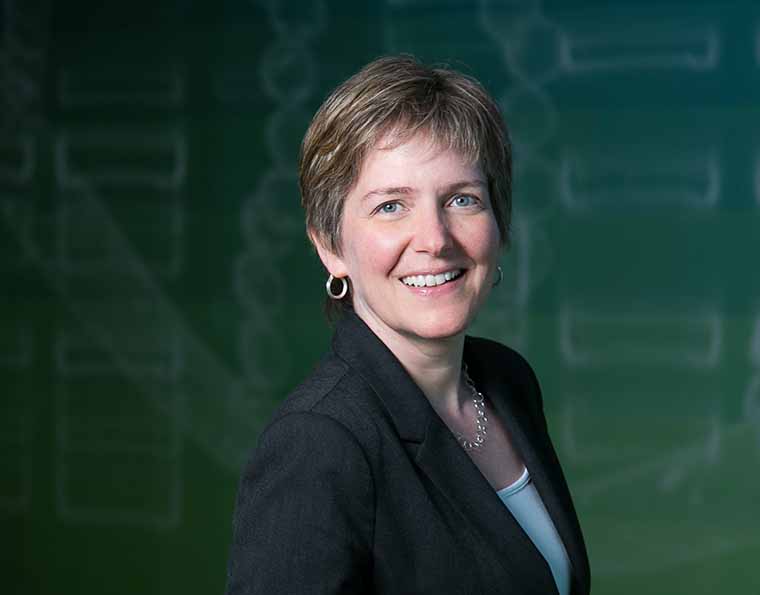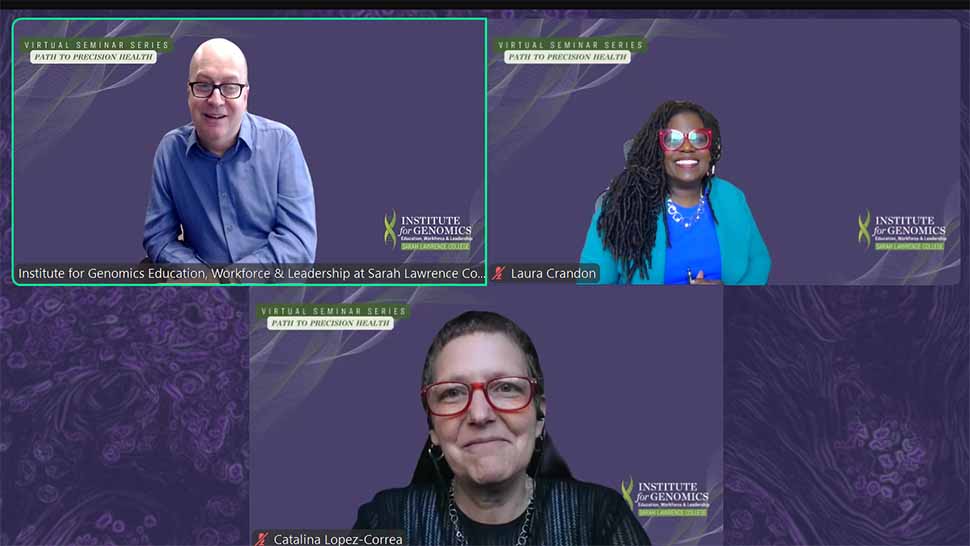On July 16th, 2024, part two of our Path to Precision Health 2024 Virtual Seminar Series, “More Than Access: What Patients Want from Precision Oncology,” took place. Eric Dishman, CEO of DishStrong Innovation and a member of the Institute’s own External Advisory Council, moderated the seminar and opened with the story of Sarah Lawrence College’s revolutionary history in establishing one of the largest genetic workforces. Eric explained how the founders of the Sarah Lawrence College genetic counseling program gave birth to the field in the late sixties and early seventies when they saw new genetic technologies and a societal need to integrate that progress into people’s lives. Today, the Institute for Genomics Education, Workforce & Leadership works in conversation with this lineage to integrate this next era of precision medicine into people’s healthcare.
It’s amazing stuff, but it’s going to fail to save lives and the quality of lives and save money, quite frankly, if we don’t rethink and prepare this new “careforce” at scale.
Indeed, Eric discussed how he had the privilege in 2011 to be one of the first cancer patients to have whole genome sequencing, which led to a targeted treatment that cured his cancer. Eric was able to receive that life-saving treatment because of his privilege in his White male identity but also due to his access as a healthcare industry leader working toward curing his own cancer for twenty-three years. Since then, Eric has worked as a patient advocate to secure personalized cancer treatment for other patients, which informs his ideas about the need for a careforce to close the gaps in precision medicine delivery.
After his impactful introduction, Eric introduced his fellow panelists (or “superheroes,” as he called them) for the webinar: Laura Crandon and Dra. Catalina Lopez-Correa. Laura Crandon is the President and Founder of Touch4Life, a 501(c)(3) nonprofit organization whose mission is to increase the breast health IQ of BIPOC and under-resourced communities and eliminate breast cancer outcomes disparities, focusing on biomarker and genetic testing equity. Dra. Catalina Lopez-Correa is the Chief Scientific Officer (CSO) at Genome Canada. She has dedicated her career to genomics and its transformative applications in life sciences in Canada and internationally. Eric first asked both panelists to discuss their inspiration to close gaps in precision oncology. Laura and Catalina each shared that their work is informed by their lived experiences with cancer and their access to precision medicine during their cancer battles. They both participate in large-scale organizational careforce work for the under-resourced communities with which they identify to share this same access. During the seminar, Laura discussed her personal experience with breast cancer that metastasized to her brain and how, despite a diagnosis “to turn to her faith” as a last resort, her experience as a health plan executive allowed her to get access to a clinical trial. Once in the trial, though, Laura described realizing how non-normative her existence was in such a trial. She explained:
I didn’t know that being in a clinical trial and being a Black woman meant I was kind of a unicorn because only 3% of us are in these clinical trials.

Like Laura and Eric, Catalina shared her lived experience with cancer. Catalina had twenty-five years of previous experience in genomics, specializing in genomics programs across Latin America and Canada, but revealed that her diagnosis with breast cancer and personal experience as a patient completely changed her approach to her work. Catalina explained how, because she had an open social media presence, she decided to share her cancer experience online. Through sharing on social media, she was shocked by how many questions people had about genomics. It made her acutely understand how privileged she was to have a PhD in genomics, realizing that most medical teams are not as informed as she is about precision medicine. In that way, Catalina described herself as wearing a scientist hat and a patient hat. Those two hats give her insight into new technologies and the ability to intimately recognize the need to structure those technologies differently. Catalina put it perfectly, stating:
Genomics is here, yes. Genomics is changing the healthcare system, yes. But we have so much work to do to make genomics accessible.
Looking back on the webinar and what each woman shared about their inspirations, the keys to Laura and Dr. Catalina’s work seem to align exactly with the roots of genetics at Sarah Lawrence College—the work of sharing scientific knowledge and options with the wider public to help more people.
Bridging from inspiration to everyday work, Eric, Laura, and Catalina discussed the significant gaps that exist in the data, guideline adherence and policies for precision medicine. This highlights the next main theme for the discussion, beginning with Laura’s crucial point that often, even when precision medicine is considered the standard of care, under-resourced groups aren’t getting that care because they are not represented in the data. Laura poignantly shared:
We have to be in the science in order to benefit from the science.
There is also a pervasive equity problem in the adherence to recommended care standards. Laura provided a sense of what the statistics look like, explaining that even when next generation sequencing is a part of guideline-based care recommendation, about 50% of White patients will get access to that care, while only 40% of Black patients will receive it. That can be the difference between identifying a targeted therapy that can save a life or not. The panelists agreed that provider education needs to catch up with the science to appropriately and equitably utilize current standards.
Building off Laura’s points, Catalina discussed some of her more international experiences with the red tape involved in genetic testing access. She explained that genetic testing is available in Colombia, but reimbursement is so restrictive and complex that it takes a lot of time to access informative testing. By the time people can figure out that process, it is often useless because their cancer has progressed. Further, in Canada where she received her cancer treatment, Catalina was lucky enough to find an oncologist familiar with genomics. However, when she requested a DNA tumor test after undergoing chemotherapy to see if she had any residual tumor cells in her body, her medical team informed her that the test was not reimbursed by insurance and not even yet accepted as a standard of care. So, if Catalina had not paid the out of pocket expense, she would not have had access to such a test due to a lag in policy adoption of proven technologies. Similar to Laura, Catalina also explained how, in Canada, they are not allowed to capture demographic information in research studies. She shared how this affects underrepresented populations, like Latina women, who have not been studied as much and therefore lack specific population-based data to guide care decisions. Catalina summarized her and Laura’s points well:
The science is really ready to help patients make decisions and help clinicians make decisions. But the protocols and guidances are not catching up with the advancements of science.

Despite the discouraging statistics about the current gaps in precision medicine, especially for underrepresented communities, Laura and Catalina provided ample examples during the seminar of how we can work toward enhancing medical education about genomics. Laura discussed how her initiative, Black Genes Matter™, informs physicians and researchers around the country about what happens when you don’t prescribe these tests and treatments. Laura described that “We’re not there to punish. We’re there to change the outcomes,” and her experiences with health care professionals thus far are very hopeful.
Catalina is doing equally important work in Canada where she is working on more diverse databases and international initiatives to increase diversity in genomics. The other area she focuses on is addressing the bottleneck of genetic counselors. She is working with Canadian medical schools creatively, including developing training tools used by patients or professionals that explain the value of genomics, and developing web interfaces that could further expand genetic counselor education internationally.

Eric, Laura, and Catalina’s discussion revealed the current pervasive gaps in precision health, specifically in precision oncology, even though this clinical area has the available technology and guideline-supported care paths proven to save lives. Today’s system is not ready to absorb these new technologies and treatments. We will need to find new ways to ensure that these are not only prescribed, but that doctors can act upon the results to impact patient care. Some of the barriers to delivering this care were highlighted at the end of the seminar when Kelly Athman, Director of Thought Leadership with the Institute for Genomics Education, Workforce & Leadership, brought forth a viewer’s point about the need for Congress to enact the Access to Genetic Counselor Services Act (H.R.3876 and S.2323). The passing of these bills would allow the Centers for Medicare & Medicaid Services (CMS) to officially recognize genetic counselors as medical providers under Medicare. However, Eric reflected that policy is often the slowest to change. Listening to this patient-centered discussion, it is hard not to be hopeful about the future of precision health with the work of professionals like Eric, Laura, and Catalina. It also underscores the significance to the work we do here at the Institute for Genomics Education, Workforce & Leadership to further develop the workforce to ensure precision health reaches all communities.
For full details from this wonderful panel discussion between these amazing leaders in healthcare, we invite you to watch the full, free recording of this virtual seminar and sign up for our contact list to join future events. Stay tuned for information on the last webinar in the Path to Precision Health 2024 Virtual Seminar Series coming this fall.